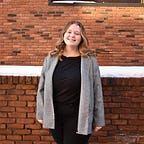Nonprofit brings justice to Rondo community
The Dispute Resolution Center brings services to the historic Rondo Community in Saint Paul to bring resolution within the community.
By Marielle Denning and Ariel Dunleavy | Reporters
Eadgyth Kamau walked into the DaVillage community house to experience her first circle meeting as an intern at the Dispute Resolution Center. As Kamau entered the room, she was struck by the group. It was full of youth from different backgrounds and ethnicities who had just finished their work with DRC. She watched as all the clients participated in sharing their stories. As she watched them hold the talking piece, and pass it over their heart, she was moved.
“To be genuinely restorative is to have a total shift in mindset towards life and our relationships,” Kamau said.
“To be genuinely restorative is to have a total shift in mindset towards life and our relationships,” — Eadgyth Kamau, Youth Restorative Practice Coordinator
In this experience as an intern Kamau got to witness the struggles and barriers that these youth face in a time of justice restoration.
“In class, we did pass the talking piece over the left, but I never connected it to, we’re passing it over our hearts, which means we are symbolically connecting ourselves and knitting our individual stories as we go around the circle,” Kamau said.
This experience was one that led Kamau to where she is now. After her internship in January, Kamau was offered a full-time “Youth Restorative Practice Coordinator” position at the Dispute Resolution Center. She works alongside Executive Director Roslyn Harmon and Housing Manager Precious Lowery to give this experience to everyone who walks through the doors of DRC. To give the Rondo community a safe space.
“I want DRC to be able to have their doors open,” Harmon said. “To be able to provide restorative services and mediation services for those people before they go and do what they are gonna do. I want us to not only be able to be in the courts, to be in the juvenile spaces, I want to be in the community and offer our services to the community and our circle keepers and our community members. That’s a great start for us, but I really want our doors to be open so that if anyone is having any type of conflict, or anything, they know that they can come to DRC and talk it out, work it out.”
The DRC’s mission is to “promote the constructive resolution of conflict through open communication and shared decision making.” This is done through restorative and meditative actions.
Restorative training is done mainly in circle, which is a time for people to share their experiences and “speak their truth,” Harmon said, in a respectful way. To give people the opportunity to share how they feel with those who have been in similar circumstances.
Being in circle is a time to not only solve a problem but to “reconnect our hearts to each other,” Kamau said.
With the new coronavirus pandemic, this time for healing has been altered.
“Restorative is done in person. You’re able to feel the emotion,” Harmon said. ‘It’s powerful being in circle.”
COVID-19 has impacted the way the circle operates.
“For us to create this platform virtually moving forward … is going to take some time and getting used to,” Harmon said.
When responding to the COVID-19 outbreak in Minnesota, DRC has tried to keep the same energy in circle meetings, even without being together physically. Being virtual has affected the non-profit in ways that are both positive and negative. With circle meetings being virtual, it can be hard to read body language and react to the emotions in the room, without a room present. And without the certainty of internet access, it can be hard to make sure it is accessible for some clients.
The virtual aspect, however, makes it easier for clients who are “not mobile” to attend. In the end, the DRC is more accessible for more people, and there’s another benefit to digital communication.
“Using virtual platforms creates an intimacy that reverses and changes our negative biases questioning how this could work,” Harmon said.
Even in a virtual space, there is no judgement and everyone is equal, she said.
“Our online work with clients in court and schools, allow us the opportunity to bring our services directly to their living room.” –Roslyn Harmon, Executive Director
Mediations have also been affected by COVID-19. Normally, mediations allow for problems to be solved without needing to go to court, but due to the coronavirus pandemic, courts needed to shut down. Only recently have the housing courts started to reopen, allowing work to begin again.
“Now, our mediations are being filled up with clients that need online services,” Harmon said. “Our online work with clients in court and schools, allow us the opportunity to bring our services directly to their living room.”
Taking this one day at a time, DRC and their team are just happy that they can continue to help Rondo residents resolve problems in healthy ways.
